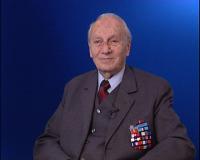If I had not shot, I would have been shot. It was the matter of survival

Stáhnout obrázek
Otto Wagner was born on August 7, 1924 in Bratislava into the seller’s family. Along with his brother they grew up in a harmonious background and thus he could pursue his studies. He never suffered because of his Jewish origin; however, the situation changed radically in 1938, especially after the establishment of the Slovak State in 1939. Along with his brother and parents they expected nothing good from the new regime, but reality was even much worse. Then, Otto moved to his friend’s house in Horský Park. In April 1942, when he was still there, he got a letter from his parents, who asked him to come back and to go with them to the camp in Žilina. However, Otto’s parents were sent to the concentration camp in Poland, from which they never returned. Otto’s friend gave him his own papers and thus Otto could live in Bratislava under the name Ľudovít Krajčovič. However, despite all the efforts, his real identity was revealed one day and he was taken to a labour camp in Nováky, where he was interned until the outbreak of the Slovak National Uprising. After the dissolution of the camp in August 1944, he got involved in the fights within the Slovak National Uprising and went through the military training in Kostoľany, after which he was sent to fight against the German troops. At first, he was a member of the 9th Battalion Jegorov, later he was appointed the head of intelligence of the 9th Battalion Jegorov-Stalin. In October 1944, he was taken captive and was deported to the concentration camp of Mauthausen in Upper Austria. Starvation, diseases, slave labour, constant fear, and death were a daily routine there. He believes that only a good physical condition, which he gained as an active sportsman before the war, helped him survive. He had to live in these inhumane conditions until May of 1945, when the American troops arrived in the camp, though the majority of guards had left the camp before it was liberated. He returned to his hometown in August 1945. After the war, he completed his university education and finished the part-time study at the School of Economics. Later, he worked as a head of geodesy, but after his son’s emigration from the communist Czechoslovakia, he was relegated to the post of an ordinary officer overnight. Otto worked in the Slovak Confederation of Political Prisoners in Bratislava for many years; he was the chairman of the Association of Prisoners of Concentration and Internment Camps in Slovakia and he also was an active member of the chairmanship and plenum of the Central Council of the Slovak Union of Anti-fascist Fighters.
